 It is fitting that Ang Lee's new film Taking Woodstock is being released now as we pause to look back at those "3 days of peace & music." It tells the story of how the greatest music festival of all time came to be and shows the impact it had on the local families, their community and the world. It was called "Woodstock" because it was supposed to take place in Woodstock, NY as a much smaller event. As the project grew the location was changed to the town of Wallkill, NY, but when the local government of Wallkill banned the festival the promoters began to look for yet another location. Elliot Teichberg, the central character of the film, saw a newspaper article about the festival being banned in Wallkill, and, having already acquired a permit for an outdoor music festival, contacted Woodstock Ventures and offered to host the event in Bethel, NY.
It is fitting that Ang Lee's new film Taking Woodstock is being released now as we pause to look back at those "3 days of peace & music." It tells the story of how the greatest music festival of all time came to be and shows the impact it had on the local families, their community and the world. It was called "Woodstock" because it was supposed to take place in Woodstock, NY as a much smaller event. As the project grew the location was changed to the town of Wallkill, NY, but when the local government of Wallkill banned the festival the promoters began to look for yet another location. Elliot Teichberg, the central character of the film, saw a newspaper article about the festival being banned in Wallkill, and, having already acquired a permit for an outdoor music festival, contacted Woodstock Ventures and offered to host the event in Bethel, NY. Having been originally designed as a for-profit investment, Elliot's family motel is granted exclusive rights to distribute passes to the event, and a few people begin to straggle in looking to score the "magic tickets" while construction crews begin to build the stage and prepare for the concert. But soon the town is overwhelmed by a flood of hippies after word accidentally gets out that it was a free concert featuring Janis Joplin, Jimi Hendrix, The Who, Creedence Clearwater Revival, and many others. Having little time to prepare, the organizers cut the fence and acknowledged they would take a huge financial hit as they had no way to sell or collect tickets for the mass of humanity that was arriving in greater numbers by the day. The result, while unlikely, was magical.
Having been originally designed as a for-profit investment, Elliot's family motel is granted exclusive rights to distribute passes to the event, and a few people begin to straggle in looking to score the "magic tickets" while construction crews begin to build the stage and prepare for the concert. But soon the town is overwhelmed by a flood of hippies after word accidentally gets out that it was a free concert featuring Janis Joplin, Jimi Hendrix, The Who, Creedence Clearwater Revival, and many others. Having little time to prepare, the organizers cut the fence and acknowledged they would take a huge financial hit as they had no way to sell or collect tickets for the mass of humanity that was arriving in greater numbers by the day. The result, while unlikely, was magical.
In the end over 500,000 people would show up, causing traffic jams over 100 miles long. The music, while amazing in its own right, almost become secondary to the true meaning of what transpired there. People came together in celebration of peace and formed a massive makeshift community of love. They survived in the mud on barely any food, and no one cared or complained. Some set up tents to help people on bad acid trips and others gave out food for free. While some people in the town were looking to cash in, the people who came didn't care about money, they only cared about the experience and the community. They wanted to make a statement to the world, and merely by their peaceful presence, they did.
Taking Woodstock picked up on this, and that's really what the film is about. The concert itself is never shown and exists only as the backdrop for the story of the Teichberg family and their property that became a temporary home for many of the people there for the festival. Elliot, played by Demetri Martin, is the person through which the audience sees the Woodstock experience. He runs around, trying to help where he can, forced into situations over his head, and deals not only with the hippie invasion but also with his own parents, played brilliantly by Imelda Staunton and Henry Goodman, both of whom deserve Oscar nominations for their roles. They are elderly immigrants and don't fully understand what is going on around them, and they rely on their son to hold everything together.
Emile Hirsch and Liev Schreiber also turn in outstanding supporting performances. Hirsch is a young Vet back from Vietnam, struggling to readjust to life without war and Schreibe
 r plays a former Marine turned transvestite who provides "security" for the Teichberg family. Taking Woodstock is a very brave film, never shying away from showing things exactly as they were, full frontal nudity, sex in the bushes, and acid trips in vans included. When Director Ang Lee used split-screen sequences in his film Hulk (2003), based on the comic book series, it came off as cheesy, but here the technique comes off as homage to the documentary Woodstock (1970), and it effectively demonstrates the massive scale of the event depicted. The film manages to be more than simply a feature film version of the famous documentary, which may disappoint some, but ultimately it was a wise choice to focus on the back story rather than the musical performances.
r plays a former Marine turned transvestite who provides "security" for the Teichberg family. Taking Woodstock is a very brave film, never shying away from showing things exactly as they were, full frontal nudity, sex in the bushes, and acid trips in vans included. When Director Ang Lee used split-screen sequences in his film Hulk (2003), based on the comic book series, it came off as cheesy, but here the technique comes off as homage to the documentary Woodstock (1970), and it effectively demonstrates the massive scale of the event depicted. The film manages to be more than simply a feature film version of the famous documentary, which may disappoint some, but ultimately it was a wise choice to focus on the back story rather than the musical performances.The most striking thing that the film illuminates, indirectly, is that something like this would be impossible to achieve today. Promoters and organizers would plan it better, make sure to charge a ton of money up front, and there wouldn't be a groundswell of cultural support. The youth today is fragmented, isolated by the internet and on-demand television, and there are no overriding, unifying ideologies that drive movements in the same way there was in '69. Even just a few months after Woodstock they tried to replicate the magic by holding a free concert in California called Altamont which was a complete disaster, as was Woodstock '99. It just shows that you can't force magic to happen, it has to be a natural outcome from the right set of circumstances.
Taking Woodstock (2009) 9/10
 We've all seen plenty of "Rom-Coms" and by now we all know the formula by heart. Boy meets girl, they hit it off at first, then there's a big misunderstanding and the relationship goes in the tank, each principal character hangs out with their friends to go over what went wrong and figure out how to move on with the rest of their lives, and then the rest of the film is a big build up to the couple getting back together in the end. It's been done countless times, and yet, for some reason, people keep paying to see the same movie played out with different actors in different settings over and over again. Why?
We've all seen plenty of "Rom-Coms" and by now we all know the formula by heart. Boy meets girl, they hit it off at first, then there's a big misunderstanding and the relationship goes in the tank, each principal character hangs out with their friends to go over what went wrong and figure out how to move on with the rest of their lives, and then the rest of the film is a big build up to the couple getting back together in the end. It's been done countless times, and yet, for some reason, people keep paying to see the same movie played out with different actors in different settings over and over again. Why? Hopefully, (500) Days of Summer will help show some people what they've been missing. It only makes sense because love is emotional. It's not always neat and pretty and, in fact, often relationships are downright messy and difficult. Perhaps that's why the opening narration of (500) Days warns the audience that "this is not a love story." In fact, it's the story of a young man named Tom (Gordon-Levitt) who works as a writer for a greeting card company. He's grown up believing that he will never be fulfilled as a person until he meets "the one" special girl he's destined to spend his life with. Enter Summer (Deschanel), the new girl in the office. Tom falls for her at first sight and believes his destiny has finally found him.
Hopefully, (500) Days of Summer will help show some people what they've been missing. It only makes sense because love is emotional. It's not always neat and pretty and, in fact, often relationships are downright messy and difficult. Perhaps that's why the opening narration of (500) Days warns the audience that "this is not a love story." In fact, it's the story of a young man named Tom (Gordon-Levitt) who works as a writer for a greeting card company. He's grown up believing that he will never be fulfilled as a person until he meets "the one" special girl he's destined to spend his life with. Enter Summer (Deschanel), the new girl in the office. Tom falls for her at first sight and believes his destiny has finally found him.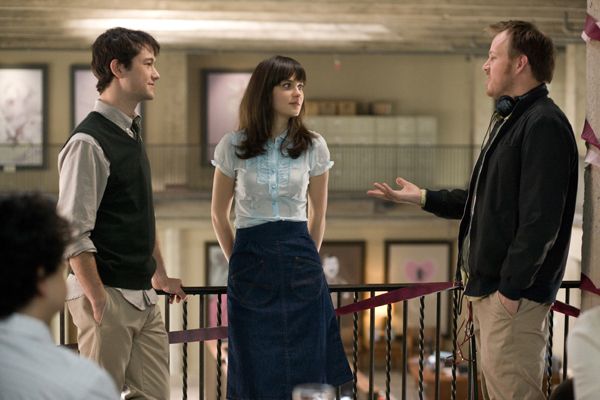
 The final product, after all the anticipation, certainly is epic, clocking in at 149 minutes, but whether or not it's a masterpiece isn't quite as certain. The film is about a group of Jewish-American soldiers who are dropped into occupied France in order to wreak havoc behind enemy lines before the rest of the Allied military makes its main assualt inland. Tarantino is a difficult director to evaluate objectively. His films are uniquely his own, despite the fact that he borrows so much from his various inspirations. This is the contradiction that is Quentin Tarantino. He is a well known lover of "genre cinema" which is a way of saying that he has spent a lot of time watching B-movies designed purposely to fit within the conventions of a specific genre, and these films directly influence his work. Some would say he outright steals from them.
The final product, after all the anticipation, certainly is epic, clocking in at 149 minutes, but whether or not it's a masterpiece isn't quite as certain. The film is about a group of Jewish-American soldiers who are dropped into occupied France in order to wreak havoc behind enemy lines before the rest of the Allied military makes its main assualt inland. Tarantino is a difficult director to evaluate objectively. His films are uniquely his own, despite the fact that he borrows so much from his various inspirations. This is the contradiction that is Quentin Tarantino. He is a well known lover of "genre cinema" which is a way of saying that he has spent a lot of time watching B-movies designed purposely to fit within the conventions of a specific genre, and these films directly influence his work. Some would say he outright steals from them.

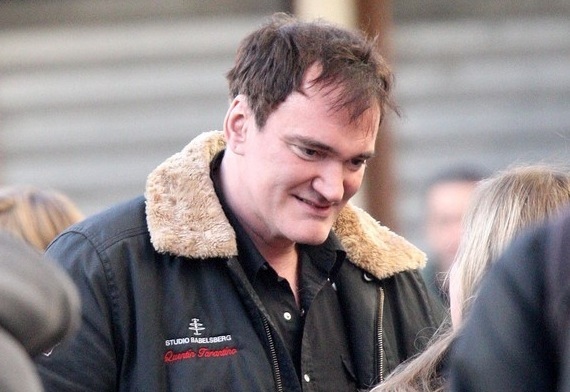 In the end, the audience has to make a simple choice. You can be continually disappointed that Tarantino will probably never make an entirely serious film without incorporating some element of parody or homage to genre cinema, or you can choose to accept him for who he is and appreciate his rare skill as a writer and his ability to show us a side of storytelling otherwise unavailable in the mainstream. It's up to you.
In the end, the audience has to make a simple choice. You can be continually disappointed that Tarantino will probably never make an entirely serious film without incorporating some element of parody or homage to genre cinema, or you can choose to accept him for who he is and appreciate his rare skill as a writer and his ability to show us a side of storytelling otherwise unavailable in the mainstream. It's up to you.

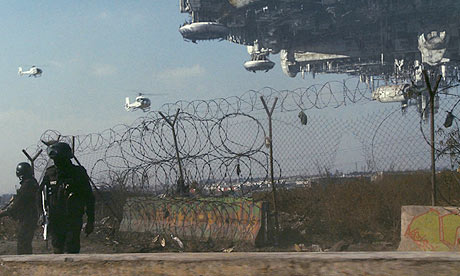 The setting of the story, South Africa, is significant in that the story seems to be an allegory of Apartheid. The aliens are given shacks for shelter and the means to survive, but they are segregated, discriminated against and exploited out of fear. But after all, they are, well... alien, and naturally don't interact well with humans. What they perceive as playful fun humans see as disruptive violence, and instead of making an effort to integrate them into society they are locked away and despised by the human majority. Under the guise of trying to help the creatures, an agency called MNU, sort for Multi-National United (whose trucks look more than a little bit like UN vehicles), are secretly trying to discover how to use alien weapon technology for their own gain, and all other ethical considerations are of no importance.
The setting of the story, South Africa, is significant in that the story seems to be an allegory of Apartheid. The aliens are given shacks for shelter and the means to survive, but they are segregated, discriminated against and exploited out of fear. But after all, they are, well... alien, and naturally don't interact well with humans. What they perceive as playful fun humans see as disruptive violence, and instead of making an effort to integrate them into society they are locked away and despised by the human majority. Under the guise of trying to help the creatures, an agency called MNU, sort for Multi-National United (whose trucks look more than a little bit like UN vehicles), are secretly trying to discover how to use alien weapon technology for their own gain, and all other ethical considerations are of no importance.
 Next up, 9, is set at some point in a post-apocalyptic future in which seemingly all humanity has been destroyed. Small creatures with numbers for names seem to be the only remaining life and they battle giant machines for their survival. It's a computer animated film produced by Tim Burton, and at least appears to be worth a look. Trailer
Next up, 9, is set at some point in a post-apocalyptic future in which seemingly all humanity has been destroyed. Small creatures with numbers for names seem to be the only remaining life and they battle giant machines for their survival. It's a computer animated film produced by Tim Burton, and at least appears to be worth a look. Trailer 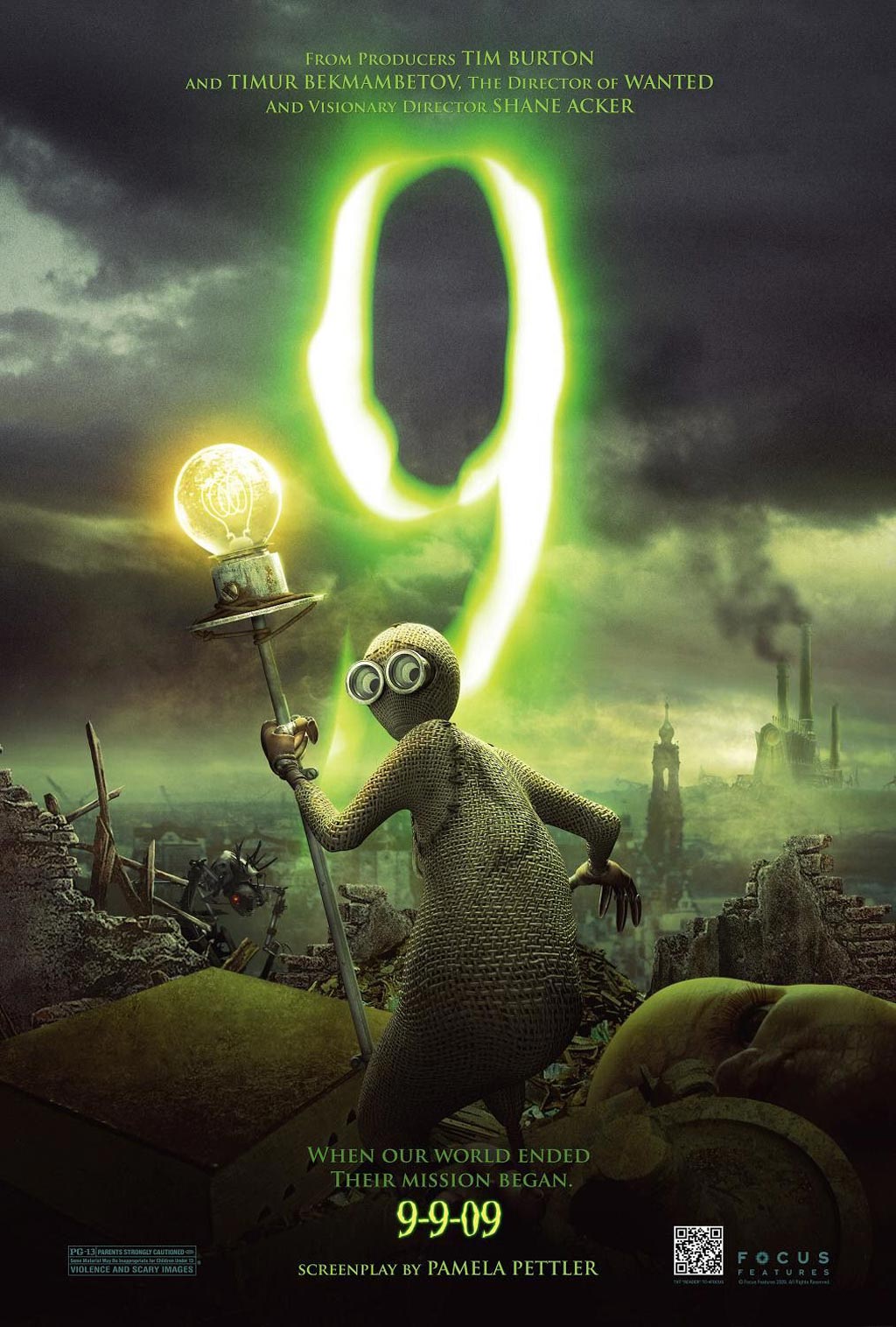 Finally, Nine, will be released just in time for awards season. It's a remake of possibly the greatest film ever made, Fellini's Italian classic 8 1/2 (1963), but this time it's being done as a musical. It's directed by Rob Marshall, who brought the Oscar winning Chicago (2002) to the big screen. It seems to star everyone in Hollywood including the amazing Daniel Day-Lewis, Marion Cotillard, Penelope Cruz, Judi Dench, Nicole Kidman, Kate Hudson, Fergie, and Sophia Loren. Personally, considering the source material, I will be most critical of this film out of the three, and from the trailer it's difficult to determine how good it will be. Trailer
Finally, Nine, will be released just in time for awards season. It's a remake of possibly the greatest film ever made, Fellini's Italian classic 8 1/2 (1963), but this time it's being done as a musical. It's directed by Rob Marshall, who brought the Oscar winning Chicago (2002) to the big screen. It seems to star everyone in Hollywood including the amazing Daniel Day-Lewis, Marion Cotillard, Penelope Cruz, Judi Dench, Nicole Kidman, Kate Hudson, Fergie, and Sophia Loren. Personally, considering the source material, I will be most critical of this film out of the three, and from the trailer it's difficult to determine how good it will be. Trailer  Only time will tell how good these three films will be, and really, other than their titles they seem to have almost nothing in common. But I felt it was worth previewing them for my loyal readers. Stay tuned for my thoughts once I see the films.
Only time will tell how good these three films will be, and really, other than their titles they seem to have almost nothing in common. But I felt it was worth previewing them for my loyal readers. Stay tuned for my thoughts once I see the films. Julie Powell, played by Amy Adams, is a young woman living in New York in 2002. She has a stressful and heart wrenching job dealing with the aftermath of 9/11 from a cubicle. She comes home every day and cooks for herself and her husband as a way of dealing with the stress. Her friends are upwardly mobile social elites moving up the ranks of the business world while she remains professionally stagnant. Julie envisions herself as a writer but she gave up on her novel, unable to maintain interest in a long term goal. What she needed was some inspiration.
Julie Powell, played by Amy Adams, is a young woman living in New York in 2002. She has a stressful and heart wrenching job dealing with the aftermath of 9/11 from a cubicle. She comes home every day and cooks for herself and her husband as a way of dealing with the stress. Her friends are upwardly mobile social elites moving up the ranks of the business world while she remains professionally stagnant. Julie envisions herself as a writer but she gave up on her novel, unable to maintain interest in a long term goal. What she needed was some inspiration.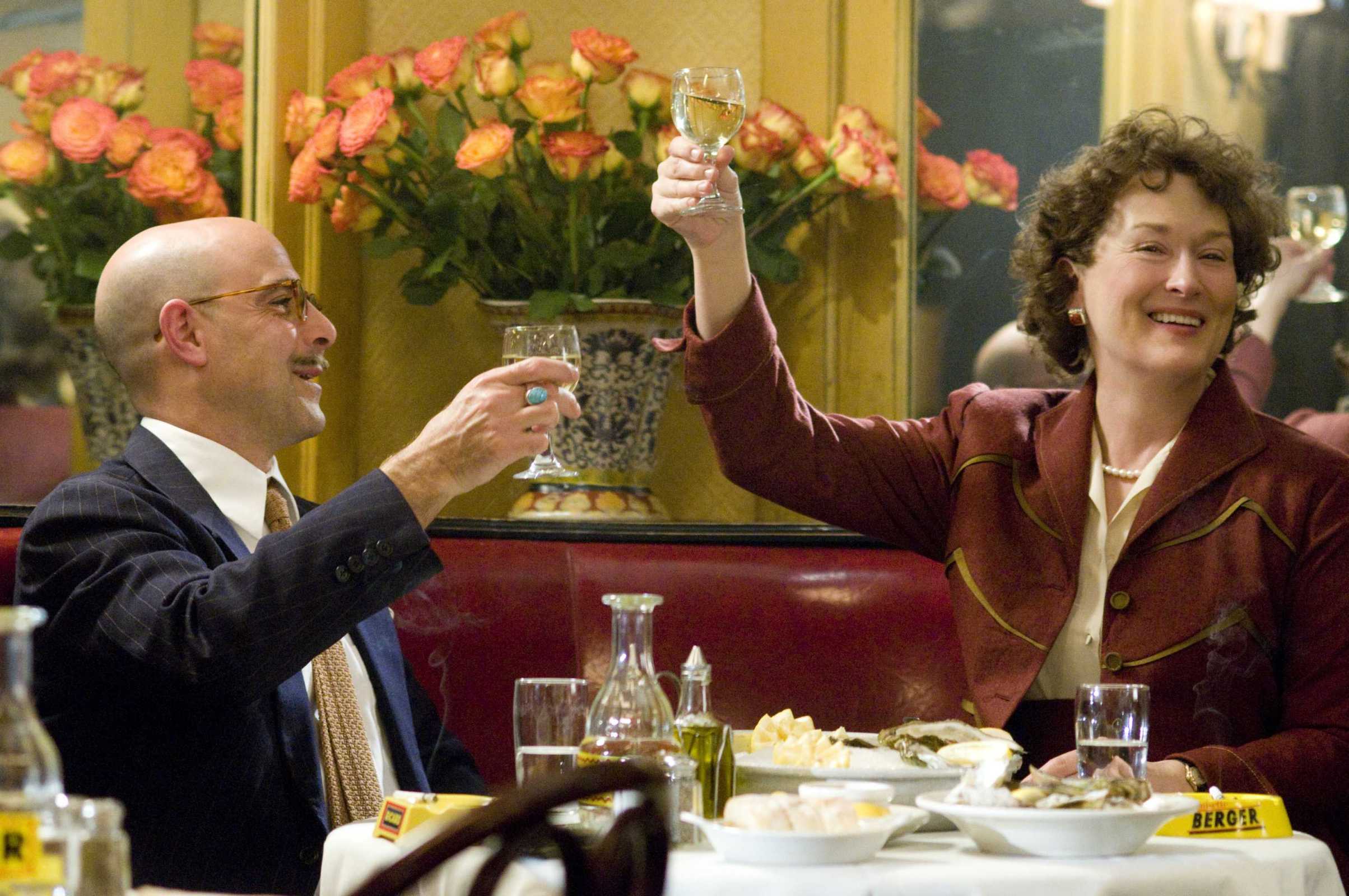

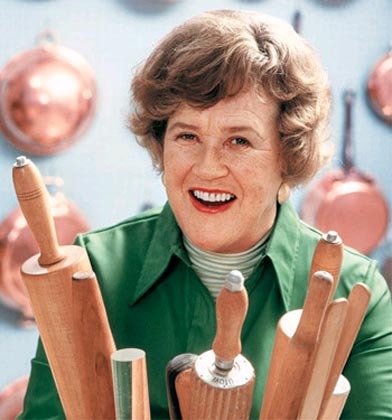
 Funny People (2009) is about one of the really lucky ones, the fictional actor and comedian George Simmons, played by real life famous actor and comedian Adam Sandler. Early in the film he learns he is dying from a rare form of cancer, and he beings to reflect on his life. He wanders through his massive house, watches his old movies on several flat panel TVs at once, and realizes that he is friendless and his life is devoid of any real meaning. He recruits a struggling stand-up comedian named Ira, played by the ubiquitous Seth Rogan, to help him write jokes and be his personal assistant. What he's really done is bought himself a friend in the same way he would have bought a new car or an expensive rug.
Funny People (2009) is about one of the really lucky ones, the fictional actor and comedian George Simmons, played by real life famous actor and comedian Adam Sandler. Early in the film he learns he is dying from a rare form of cancer, and he beings to reflect on his life. He wanders through his massive house, watches his old movies on several flat panel TVs at once, and realizes that he is friendless and his life is devoid of any real meaning. He recruits a struggling stand-up comedian named Ira, played by the ubiquitous Seth Rogan, to help him write jokes and be his personal assistant. What he's really done is bought himself a friend in the same way he would have bought a new car or an expensive rug.

 Twilight was adapted into a feature film last year, and it's soon be followed by the first of three sequels, New Moon, in November. Southern Vampire Mysteries, also known as the
Twilight was adapted into a feature film last year, and it's soon be followed by the first of three sequels, New Moon, in November. Southern Vampire Mysteries, also known as the 

 It's the general discussion message board about movies on imdb.com, the best film information resource on the Web. It can easily be found by clicking on the 'Message Boards' tab on the IMDB homepage, but be warned! Enter at your own peril. Once you step in the door and take a look around you'll find an endless stream of debates about film by people who seem to have known each other for years, because they have, and this can be slightly intimidating if you're not prepared.
It's the general discussion message board about movies on imdb.com, the best film information resource on the Web. It can easily be found by clicking on the 'Message Boards' tab on the IMDB homepage, but be warned! Enter at your own peril. Once you step in the door and take a look around you'll find an endless stream of debates about film by people who seem to have known each other for years, because they have, and this can be slightly intimidating if you're not prepared.